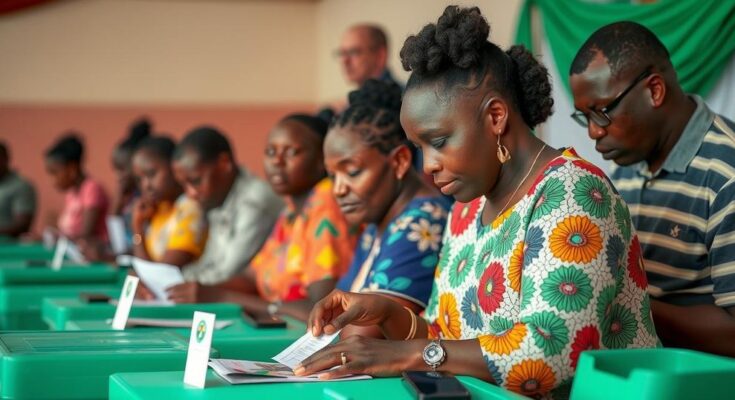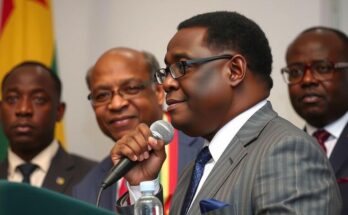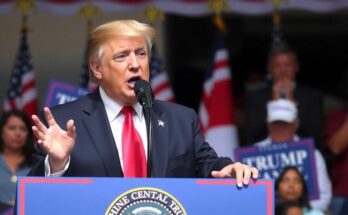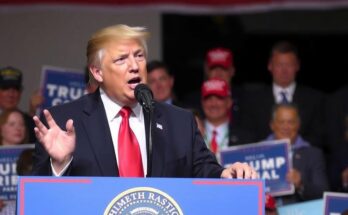Ghana held its presidential and parliamentary elections amidst hopes for economic recovery following a severe financial crisis. President Nana Akufo-Addo is retiring, and the main contenders are Vice President Mahamudu Bawumia and former President John Dramani Mahama. Confidence is high on both sides, with Mahama promising to renegotiate IMF bailout terms and Bawumia highlighting economic growth. The election process reported a generally peaceful environment, with results anticipated soon.
On Saturday, Ghana conducted its presidential and parliamentary elections against the backdrop of significant hope for economic recovery following the country’s worst financial crisis in a generation. The impending departure of President Nana Akufo-Addo, who is concluding his constitutionally mandated two terms, has set the stage for a competitive race among twelve candidates. However, the primary competition is expected to unfold between Vice President Mahamudu Bawumia of the ruling New Patriotic Party (NPP) and former President John Dramani Mahama of the National Democratic Congress (NDC).
Opinion surveys indicated that Mahama, who presided over the nation from 2012 to 2016, may be poised for a successful return. He attributed the nation’s economic challenges to Bawumia’s policies, pledging to renegotiate the terms of a $3 billion International Monetary Fund (IMF) bailout established last year. Ghana’s financial crisis reached its zenith in 2022, compelling the nation to seek IMF assistance. Mahama remarked, “This is the only election that we can all see the direction of the outcome before we start voting,” expressing his confidence in securing victory.
Bawumia, age 61, a former central banker, similarly expressed optimism after casting his ballot in his constituency. His campaign emphasized the gradual economic recovery, noting a 6.9% year-on-year growth in the second quarter of 2024, which is the most significant growth rate in five years. Bawumia stated, “By the grace of God, I’m very hopeful of winning this election. I think that we have done a lot of work. We have put our message to the people, I think the message has been well received.”
As both candidates exercised their right to vote, reports indicated a calm and peaceful environment, albeit with isolated incidents of violence. Supporters of the NDC celebrated in the streets of Accra following early reports of favorable results. The electoral commission confirmed that over 99% of polling stations opened on schedule and reported high voter turnout. However, Benjamin Bano-Bio, director of electoral services, noted the occurrence of violence at some locations, resulting in one fatality.
Following the closure of polls at 1700 GMT, election teams commenced ballot counting under the supervision of party representatives. While provisional legislative results are expected late Saturday and into Sunday, awareness surrounding the presidential outcome could emerge by Tuesday, contingent on ongoing trends. Approximately 18.7 million out of Ghana’s 34 million residents are eligible voters.
The political landscape in Ghana has seen significant shifts due to economic challenges, notably marked by a serious financial crisis that began affecting the country profoundly in recent years. The context of this election is crucial as Ghana seeks to navigate its path to recovery from a debt crisis that prompted a major IMF bailout. The departure of President Akufo-Addo represents not just a change in leadership but also an opportunity for new economic policies to be considered by voters, as they express their preferences through the ballot. The electoral competitiveness between the current Vice President and a former President reflects a broader struggle within Ghana’s political context as the electorate grapples with the implications of past governance on current and future economic conditions. The election process indicates both a moment of potential optimism as well as uncertainty for the future of economic management in the West African nation, making the election outcomes particularly significant.
The presidential elections in Ghana represent a pivotal moment for the nation following a combination of economic turmoil and public discontent. With former President Mahama campaigning on promises to alter existing economic policies and Vice President Bawumia advocating for continued recovery efforts, the electoral outcome will significantly influence Ghana’s economic trajectory in the coming years. Voters’ choices will reflect their aspirations for revitalization post-crisis, marking an essential chapter in the country’s democratic process.
Original Source: www.voanews.com




